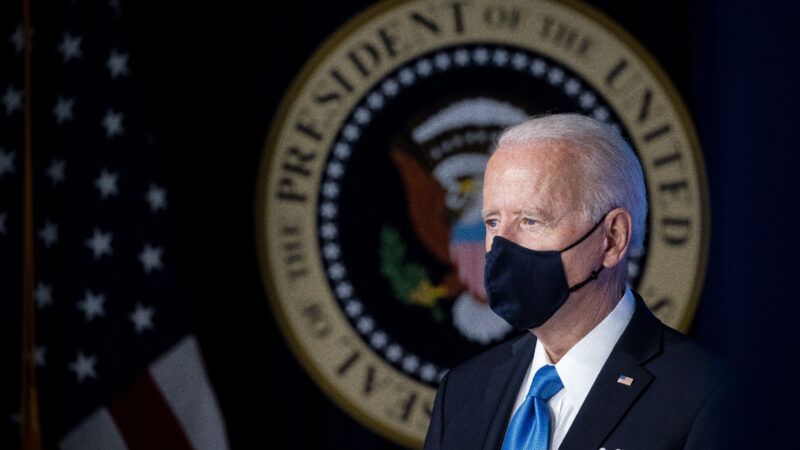Biden's Coronavirus Relief Plan Will Probably Cost a Lot More Than $1.9 Trillion
The pandemic relief bill isn't just a one-time splurge. It's the start of a new era of federal spending.

Looked at one way, the American Rescue Plan, President Joe Biden's $1.9 trillion economic intervention, is just another pricey COVID-19 bill in a series of them—another one-time injection of funds into an economy in crisis. Biden has repeatedly agreed that the plan is fundamentally about quick, emergency relief, an in-the-moment, temporary measure to beat back the pandemic and get the economy going.
Over the long term, however, it's likely to be much more than that—more expensive and more permanent than the headline figures make it sound. And it portends an even greater expansion of federal power to come.
Like previous bills, Biden's plan includes a round of checks for American households, with as much as $1,400 going to individuals making as much as $80,000 annually, and couples with total incomes of up to $160,000. It extends an existing federal boost to unemployment insurance payments and includes money for states, for primary education, for airlines, and for a grab bag of Democratic priorities, many of which predate the pandemic.
For example, the plan funds an $86 billion bailout to multiemployer pensions. The plan props up underfunded pension schemes for about 185 unions, many of which had relied too heavily on risky investments rather than worker contributions. The pensions were melting down long before COVID-19 became a threat: As The New York Times dryly notes, the bailout represents an aid package that "has nothing to do with the pandemic."
That's typical of this bill, which is heavy on handouts to a slew of Democratic constituencies. Teachers unions have been clamoring for an infusion of federal funds, arguing that such funding is essential for reopening classrooms for in-person instruction.
So the bill includes about $130 billion in primary education funding. But very little of that money—only about $6 billion—will be spent this fiscal year, in part because previous coronavirus spending bills provided more than $100 billion in education money. This isn't funding that will be used to reopen schools now; it's a slush fund that will balloon federal education spending for years to come. In the process, it will create a new baseline for federal education funding, one that will likely be hard to scale back.
Which is why this isn't just another spending bill: It's a revolution in the federal approach to social programs, or at least the start of one. It's designed to kickstart an expansion of pricey federal social programs, particularly on children and health care.
For example, the bill includes a $34 billion boost to Obamacare's private insurance subsidies, designed in part to remedy a problem that the health care law helped create: Plans sold through Obamacare's exchanges tend to be fairly expensive, and thus unaffordable for those who don't qualify for subsidies. Biden's recovery plan boosts subsidies and makes higher earners—in some instances households earning well into six figures—eligible for federal assistance.
For now, this boost is temporary, lasting just two years. But there's little doubt that Democrats will push for the additional spending to become permanent. Over time, that nominally temporary $34 billion could end up costing more like $160 billion, according to the National Taxpayers Union Foundation. This isn't emergency aid; it's a likely permanent expansion of Obamacare, smuggled in under the guise of pandemic relief.
The same goes for the plan's expansion of the child tax credit. As a result of Biden's plan, most parents in the country will receive a monthly check of up to $300 per child. Like the Obamacare subsidies, this too represents a temporary boost. Under the current plan, the program lasts for just one year, at an on-paper cost of about $100 billion.
But as with the Obamacare subsidies, there is every reason to expect that Democrats will push to extend the plan, setting up a permanent system of checks to parents, at a true cost closer to $770 billion, according to NTUF.
Again, I will refer to the way the child tax credit plan is described in a New York Times news—not opinion—report: "The child benefit has the makings of a policy revolution. Though framed in technocratic terms as an expansion of an existing tax credit, it is essentially a guaranteed income for families with children," similar to programs found in other countries.
A guaranteed income. A policy revolution.
Biden's recovery plan isn't just (or even mostly) pandemic relief. And it's not just a one-time infusion of cash to Democratic supporters and political allies.
It's the start of a new era of federal largesse, one that will move more Americans onto government support, perhaps for a long time to come.
Although it differs in the particulars, in some ways this represents a return to the sort of welfare system that President Bill Clinton and congressional Republicans reformed in the 1990s. Those reforms were judged successful because they resulted in dramatic reductions in the number of people on welfare.
Less than two months after his inauguration, Biden, with the help of congressional Democrats, is reshaping the American economy. And there's more to come: Influenced by union wish lists, Biden has, according to a recent Times report, expressed a desire to pursue a new industrial policy, with federal job supports, energy restrictions, and trade barriers. The headline on the report? "The Biden team wants to transform the economy. Really."
Biden campaigned as a moderate, opposed to the big-spending, heavy-handed, progressive radicalism of rivals like Sen. Bernie Sanders (I–Vt.) and Sen. Elizabeth Warren (D–Mass.), who insisted that what America really needed was "big, structural change." Biden, in contrast, merely wanted to return to normal.
But in his opening legislative bid, he's made clear: There is no return to normal. Big structural change is upon us, backed by Biden and Democrats in Congress. This is only the beginning.


Show Comments (64)